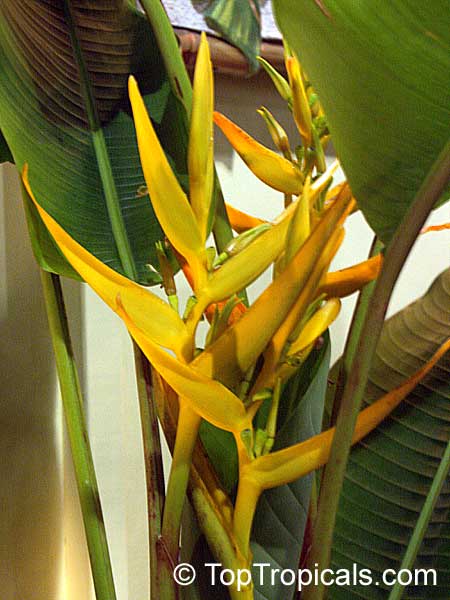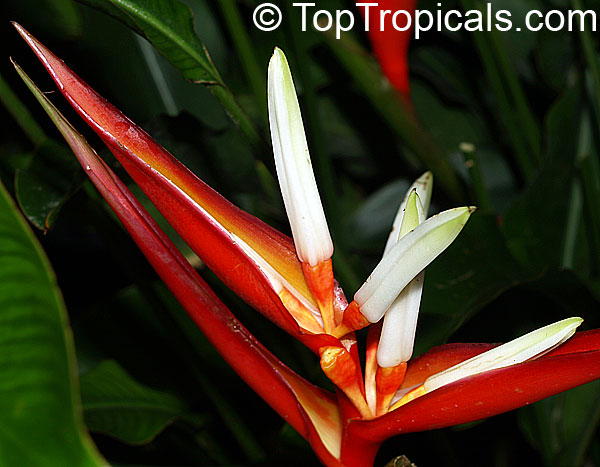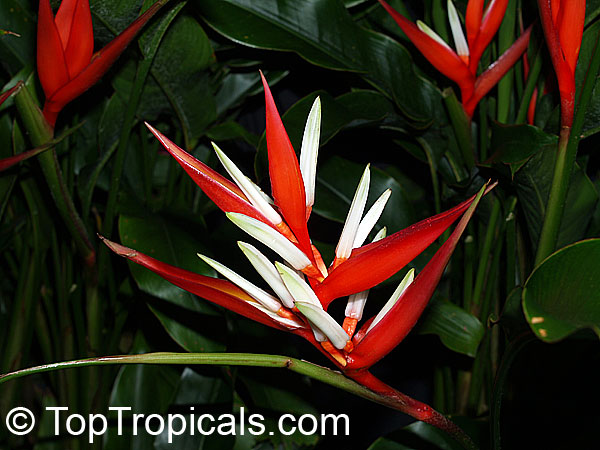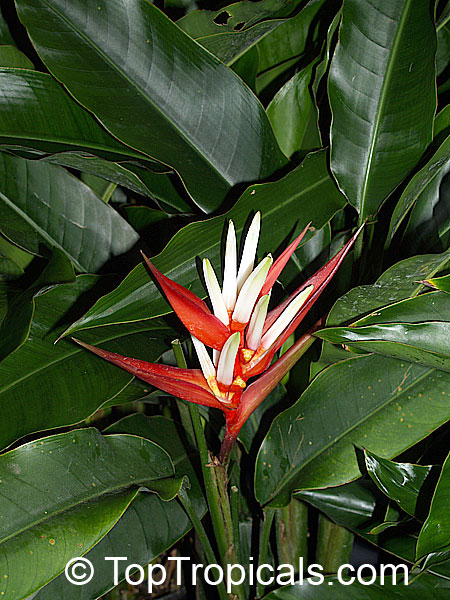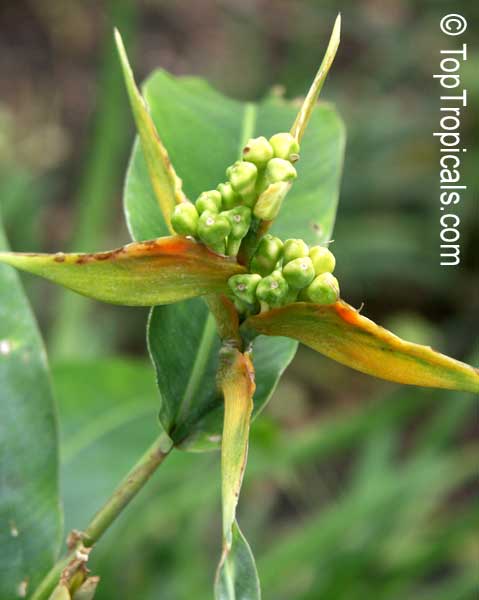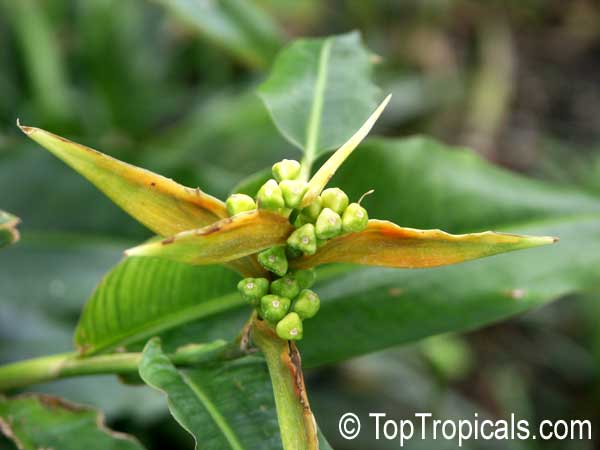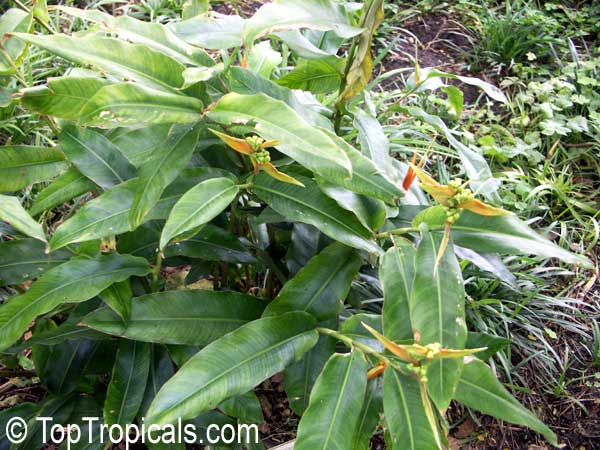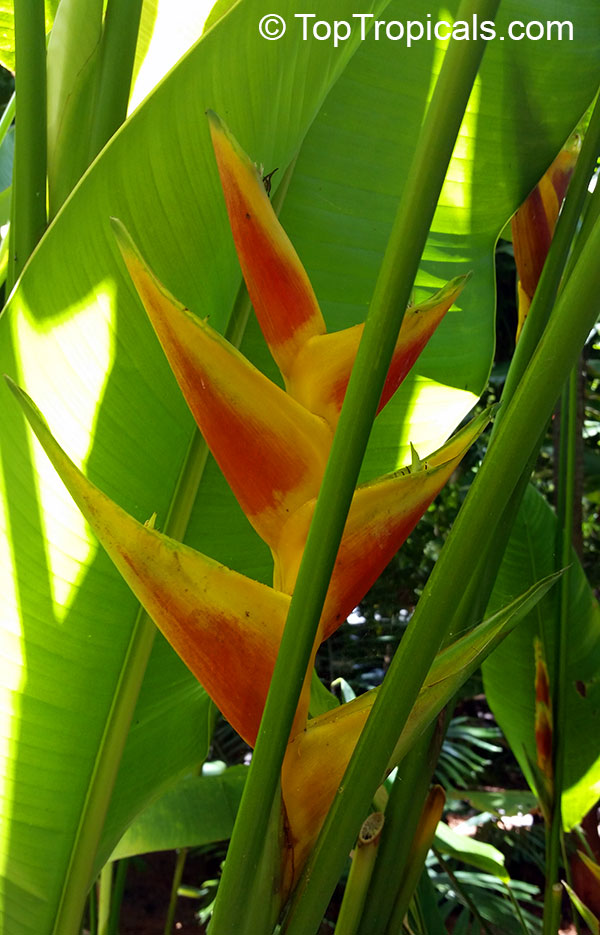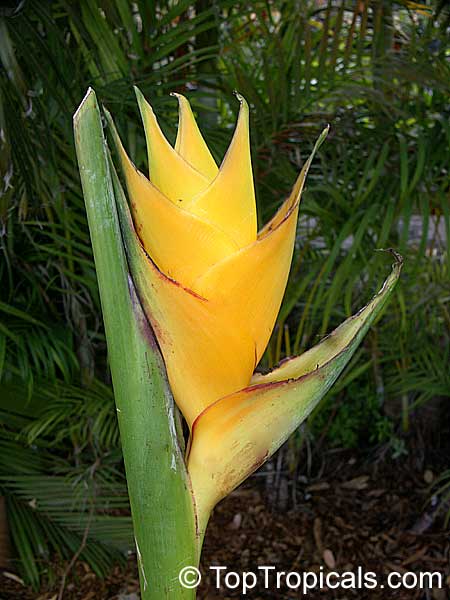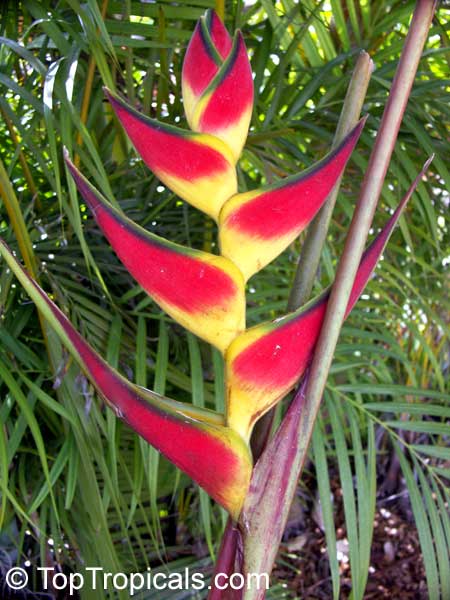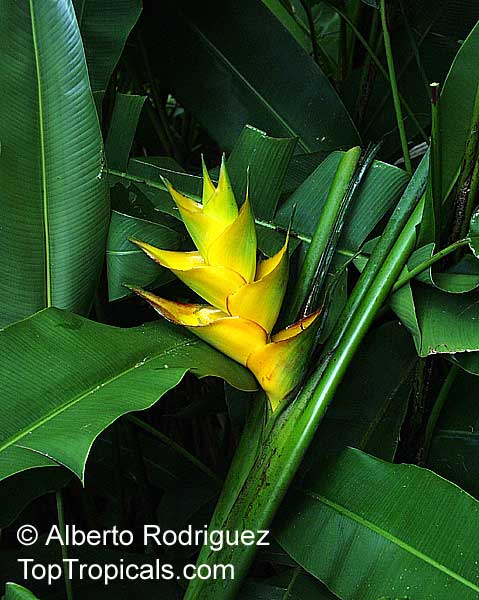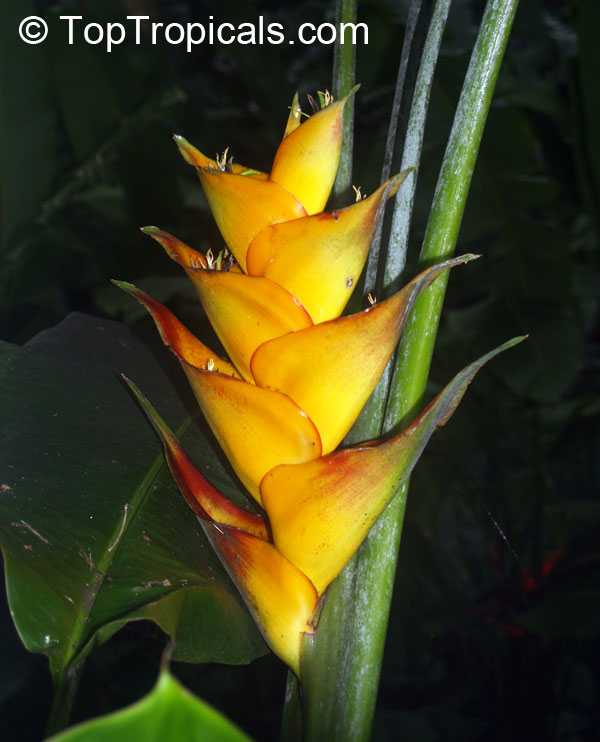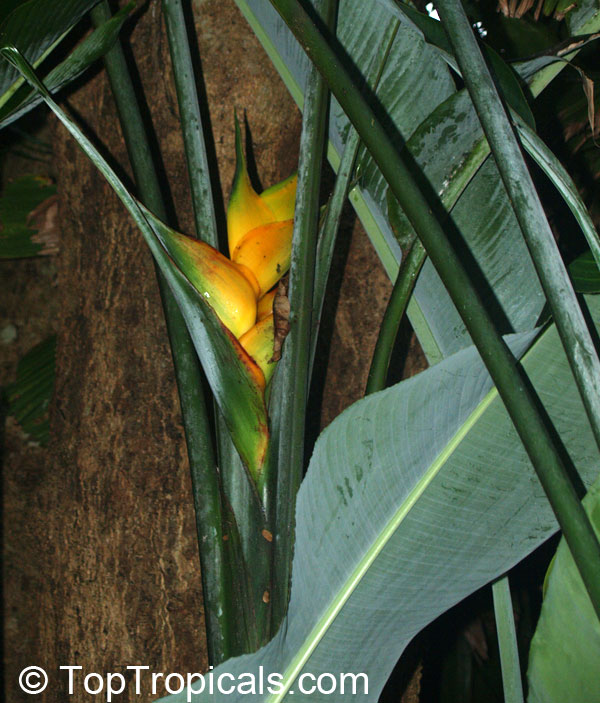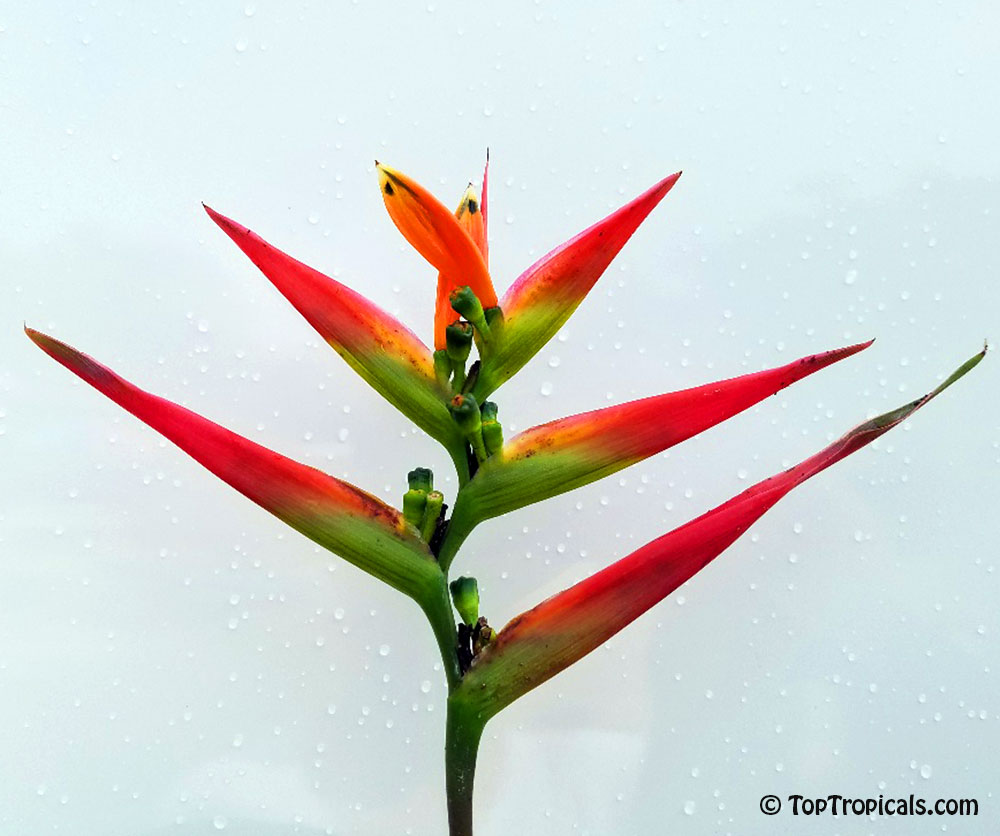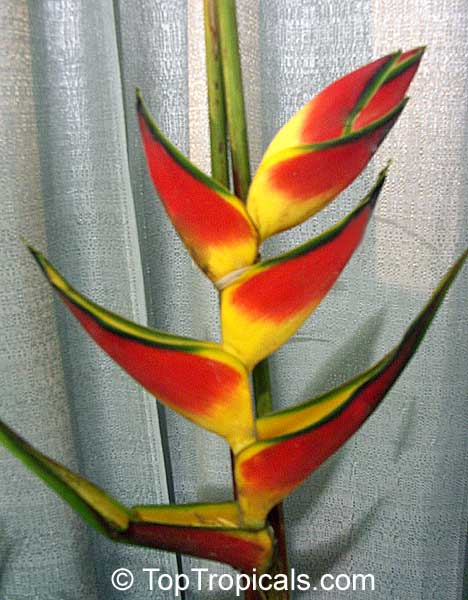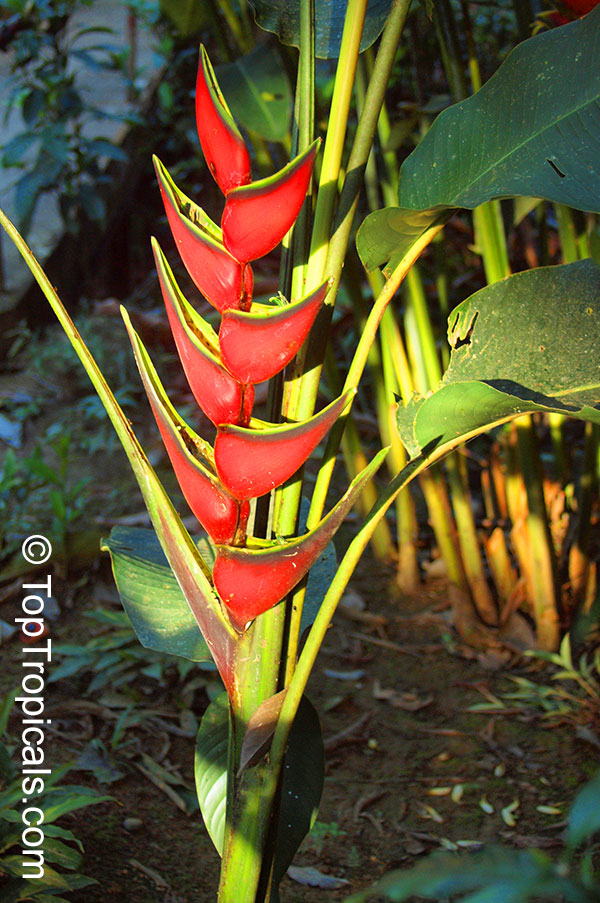Heliconiaceae - Botanical Family
| Number of plants found: 15 | Next | 
|
Go to page: | 1 | 2 |
Botanical name: Heliconia angusta
Common name: Christmas Heliconia
Family: Heliconiaceae
Origin: Mexico to Ecuador








Clump forming perennials up to 4 feet tall (1.2 m)Watering Needs: Moist, well drained soil.Propagation: Clump division, or rhizome.
Botanical name: Heliconia angusta
Common name: Christmas Holiday Heliconia
Cultivar: Christmas Holiday
Family: Heliconiaceae
Origin: Brazil
Hardiness: 35°F






Heliconia angusta, Christmas Holiday is a small shrub that typically grows 2 to 5 feet tall, although it can grow taller. It prefers full sun, but can tolerate some semi-shade. To achieve optimal growth, the soil should be rich, wet, and well-drained, with regular watering. This variety is commonly called the Christmas heliconia because its red and white inflorescences emerging during the winter Holiday season, although the plant will bloom throughout the rest of the year as well. It typically produces off-white or white flowers, often with red and crimson upper petals and vinous lower petals.
Christmas Holiday is relatively cold hardy, at least to 30 degrees Fahrenheit for a short exposure. It can also be grown in containers in cold regions, as long as those containers are brought inside during the winter months.
In areas where it can be grown outdoors in a garden, Christmas Holiday is best grown in USDA Zones 9-11. When grown outdoors in these climates, the plant will benefit from fertilizer and compost topdressing, as well as regular pruning to keep it within its desired size.
Overall, Christmas Holiday is a beautiful, cold hardy tropical shrub that can bring a lot of cheer to any garden or landscaping setting. With proper care, it can produce a stunning array of flowers with its signature red, white, and vinous color palette. With its low-maintenance growing requirements, it is a joy to share with family and friends.
Wild populations, which are native to southeastern Brazil, are classified as vulnerable.
Botanical name: Heliconia aurantiaca
Common names: Golden Dwarf Heliconia, Yellow Heliconia
Family: Heliconiaceae
Origin: Belize





Golden Heliconia - excellent cut flowers, resembling Bird of Paradise in yellow to orange! Endemic to Central America - south Mexico and Guatemala. Its natural habitat is montane forests. Tropical, evergreen perennial with short rhizomes and smooth, leathery, 7 to 16 inch long, oblong leaves. The plant is a smaller species (4 - 5 ft) with a compact, relatively small, erect inflorescence. Unusual, 8 inch long inflorescences, resembling birds of paradise, hold light yellow to orange sepaled flowers. Borne from spring through summer. Cold-sensitive and requires a minimum temperature of 40 F. This species does not tolerate heavy clearing and disturbance.
Botanical name: Heliconia bihai x marginata Rauliniana
Common names: Heliconia Paradise, Rauliniana
Cultivar: Rauliniana
Family: Heliconiaceae
Hardiness: 35°F







A very upright growing heliconia, rauliniana has red/yellow bracts the twist as they open. Inflorescence consisting of 10 to 15 spirally arranged bracts. It is a strong grower, and blooms freely in warmer months.
What makes Heliconia bihai x marginata Rauliniana distinctive?
Heliconia bihai x marginata Rauliniana grows as a vigorous clumping hybrid with tall, sturdy shoots and broad evergreen foliage that creates a dramatic vertical accent. Its inflorescences rise above the leaves and display prominent bracts in bright tones typical of bihai-lineage heliconias, enhanced by the marginata parentage that contributes crisp contrasting edges and refined color definition. The plant thrives in full sun to light shade with steady warmth, high humidity, and regular moisture in rich, well-drained soil. It performs reliably in USDA Plant Hardiness Zones 10-11, where it remains frost-free; brief chills below this range can damage young shoots, so protection is recommended in marginal climates. In suitable warm regions it becomes a dominant structural feature, producing bold seasonal displays typical of large hybrid heliconias.
Botanical names: Heliconia bihai, Bihai bihai, Heliconia humilis
Common name: Macaw Flower
Family: Heliconiaceae
Origin: Central America, Caribbean








Heliconia bihai cv.Emerald Forest has a striking solid green flower which is great for exotic flower arrangements, especially when combined with white flowers. The plant is vigorous, erect and clumping, from 6-8 feet tall. Can grow in partial shade to full sun. Blooms from March through July.
Botanical name: Heliconia caribaea
Common names: Lobster Claw, Parrot Beak
Family: Heliconiaceae
Origin: Puerto Rico, Columbia, Central America, Caribbean









Heliconia caribea is one of the largest heliconias found commonly in the trade. If in reasonable conditions, it blooms all year. Many clones are available in a variety of flower colors.
Watering Needs: Moist, well drained soil.
Propagation: Clump division, or rhizome.
One of the most impressive hybrids Heliconia Caribaea x bihai Jacquini is the harder to get large growing variety. It has eyecatching bright red/orange bracts which have a thick golden border. Jacquinii is a natural hybrid that blooms prolifically in summer and autumn with spectacular huge upright bracts. A large, erect plant habit, with big broad tropical leaves. The bihais are quite tolerant of cooler conditions. Height growth varies 5-7 ft depending on the warmth of your climate. Grows well in partial shade to full sun.
Botanical names: Heliconia collinsiana, Bihai collinsiana
Common names: Hanging Heliconia, Platanillo
Family: Heliconiaceae
Origin: Central America, Mexico




Heliconia collinsiana is a popular ornamental plant in hot regions with a humid climate. Waxy white stems and undersides of leaves with long, pendulous bracts of orange and red. The fruits are very attractive, first yellow, then becoming mature to a bright purple-blue color.
Botanical name: Heliconia hirsuta
Common name: Heliconia Costa Flores
Family: Heliconiaceae
Origin: Costa Rica








Heliconia hirsuta Costa Flores is native to Costa Rica. It blooms from late spring to early summer. The Costa Flores produces dark red bracts with yellow sepals with black accents on them. It enjoys full sun to partial shade and flourishes in zones 10 and higher. To prevent wilting, it is recommended to water this plant daily. It can grow to be 3 to 5 feet in height. Great for attracting bees, butterflies, and birds.
Botanical name: Heliconia latispatha
Common name: Expanded Lobsterclaw
Family: Heliconiaceae
Origin: Central America, Southern America








Heliconia latispatha grows up to 12 ft tall, with leaves resembling those of bananas. Inflorescence is erect, up to 2 ft long, with red or orange bracts subtending green, yellow or orange flowers. What is nice about this Heliconia is how the blooms appear at the very top of the stalk, shown off above all the leaves.
Recommended Fertilizer: SUNSHINE Robusta - Rapid Growth Booster
Botanical name: Heliconia orthotricha
Common names: Heliconia, Lobster claw
Family: Heliconiaceae
Origin: Northern South America









A showstopping perennial ornamental from the banana family, Heliconia orthotricha is native to Northern South America. These stunning plants boast bright and vibrant flowers that become the center of attention in any garden. With their colorful, large inflorescences in red, pink, and yellow hues. They attract butterflies and hummingbirds to any landscape.
The Heliconia orthotricha is a large shrub that can reach heights of 5-10 ft tall and is a petite shrub at 2-5 ft. It does best in a full sun to semi-shade environment and requires regular watering and heavy feeding in rich soil. Though it generally thrives in USDA Zone 9-11, it can in fact be grown in colder regions in a pot, although extra care must be taken when temperatures drop.
This magnificent plant produces huge red, crimson or vinous flowers, as well as stunning pink and yellow or orange blooms. The inflorescence can last up to two months, and their showy appearance makes the Heliconia orthotricha an ideal plant for anyone seeking a tropical look in their outdoor space. The plant is known for its firework-like beauty that is sure to add to any garden's wow factor.
Overall, the Heliconia orthotricha is a notable perennial ornamental to bring a tropical flair to any outdoor setting. Whether planted in the ground or grown in a pot, its stunning flowers will bring beauty, joy, and life to the space.
| Next |  |
Use link to repeat this search:
https://toptropicals.com/cgi-bin/garden_catalog/cat.cgi?search_op=and&keyword_op=and&language=e&family=Heliconiaceae
&number=10&no_change_lang=1&user=tt&sale=1&first=0
